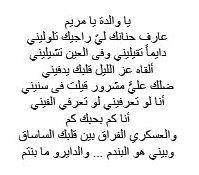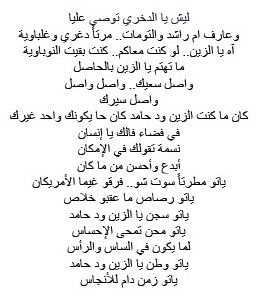
Excerpt from Ya Waldah Ya Maryam by Mahjoub Shareef
Maryam, daughter of the country, mother of men held hostage—and sometimes crucified. She did not arrive as a song but as a poem. Born in Kober prison, born in 1973, born to Mahjoub Shareef, Maryam was a plea for waiting out the darkness. She cradled stories of fight and more fight. Of cellmates who did not give—not at the first break of blood, or at the smell of copper. She was enough fuel to fight a system, enough memory beat it. Maryam was a simple woman with simple dreams. She only ever wanted freedom but the longest distance between mother and child is a paid soldier.

Excerpt from Telegraphs by Mohammad Elhassan Salim Hummeid
Sit Al-Dar bit Ahmed Jabir, born to the village of Nuri. Wife, mother, and comrade. She did not arrive as a poem but as a sickle and hammer. In the very belly of tradition, in the very heart of tribe. When they called in the village archaeology, she called theft. When they called in the city labour, she called theft. Sit Al-Dar saw whiteness for what it was, called machine a machine, called her husband a hero. She cradled stories of fight, of rebellion and small revolutions. Sit Al-Dar did not witness victory but knew it would come. She did not witness much, but reveled in all of it. She only ever wanted freedom but freedom was a train too far and a dollar that would not stretch.

Excerpt from Nora by Mohammad Elhassan Salim Hummeid
Nora, daughter of the dry years, born to the people, kin of my kin. She did not arrive as a woman but as a prophecy. Nora was made not of thick skin but thicker burdens. Gave but not from abundance, took only to make more. Nora was loved by men whose only service was in departure. Far away men who knew her dreams and shared them. Knew her fears and shared them. She cradled stories of fight from the mouth of the margin. Nora had visions of fire but Nora was promised the rain. Nora was promised return. Nora was promised the rescue. Nora had asked to learn. Chalk and board and compass. Plough and herd and grain. She only ever wanted freedom but only ever reaped the pain.
///
I, daughter of the revolution, born to my mothers before me, sister to the saved children—did not arrive by chance. I arrived armed and with intent. Cradling a gangrened womb, five young girls swallowed by the Nile, and Noura. I arrived afraid but I do not walk in fear I walk from it. I curse the uniform that calls me a whore. And curse the walls too high. And curse the beds too low. And curse the air that makes me cry. And curse the locks that turned on me. I leave behind my father’s back to curse him too. I do not wait for men to write me a poem, but I will hold their hand when they bleed. I will sing their songs and fight the war but I will fight it even after they have claimed the win.
________
QUTOUF YAHIA is a poet and writer and a cofounder at Locale, a Sudanese initiative for the development of creative efforts and local talent through cultural advocacy.
![[PANK]](https://pankmagazine.com/wp-content/themes/pank/assets/images/pank-logo-large.png)
